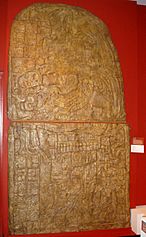Watʼul Chatel facts for kids
Quick facts for kids Watʼul Chatel |
|
|---|---|
| King of Seibal | |

Stela 10 at Harvard University showing the king Watʼul Chatel
|
|
| Religion | Maya religion |
Watʼul Chatel was an important king who ruled the ancient Maya city of Seibal. He was also known by another name, Aj Bʼolon Haabʼtal.
Contents
Watʼul Chatel: A Maya King
Becoming King
Watʼul Chatel became king of Seibal in the year 830 AD. At that time, Seibal was like a smaller kingdom. It was connected to a larger one called Ucanal, ruled by King Chan Ekʼ Hopet. This means Watʼul Chatel was a "vassal," or a ruler who had to show loyalty to a more powerful king.
Building and Dedications
King Watʼul Chatel worked to rebuild and improve Seibal. In 849 AD, he dedicated a new building and special stone monuments called stelae. These events were important. Other powerful kings, like Jewel Kʼawil from Tikal and Chan Pet from Calakmul, came to watch.
Watʼul Chatel also created a new kind of temple and stelae setup. This unique arrangement was built south of the main plaza in an area called Group A. His last known monument was put up in 889 AD. This was almost 60 years after he first became king.
What the Stelae Show
Ancient Maya kings often had their stories and images carved onto large stone slabs called stelae. These carvings tell us a lot about Watʼul Chatel.
Stela 8: The Jaguar King
On Stela 8, Watʼul Chatel is shown wearing jaguar claws on his hands and feet. He also has other features that connect him to the "Bearded Jaguar God." This suggests he had a strong connection to this powerful deity.
Stela 9: The Maize God and Vision Serpent
Stela 9 shows Watʼul Chatel with features of the Maize God. This god was very important for Maya people, representing life and food. The stela also shows him holding a "Vision Serpent." This was a spiritual image. It was believed to appear during special ceremonies.
Stela 10: Royal Visitors
Stela 10 shows Watʼul Chatel dressed in the style of the late Classic Maya period. Interestingly, his face has a mustache, which was not common for Maya rulers. The writing on this stela mentions kings from Tikal, Calakmul, and Motul de San José. It describes how these important visitors came to Seibal to meet with Watʼul Chatel.
Stela 11: The Refounding of Seibal
Stela 11 tells the story of Seibal's new beginning. It records the exact date, March 14, 830 AD, when the city was "refounded." It also marks the day Watʼul Chatel officially became king.
 | Valerie Thomas |
 | Frederick McKinley Jones |
 | George Edward Alcorn Jr. |
 | Thomas Mensah |

